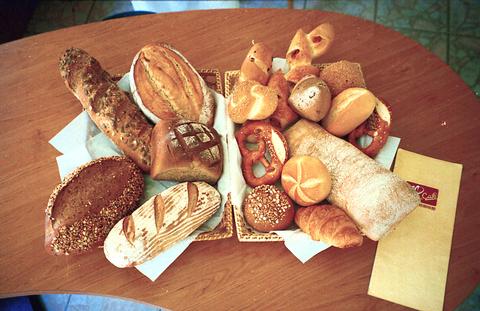Unlike many of Taipei's bakeries that fill their window displays with birthday cakes, breads of differing appearances and pastries of all shapes, the huge glass facade of the Wendel Backerei & Cafe reveals little of the expert baking that takes place within.
The German-style bakery is so unlike many of the city's more ostentatious bakeries in fact, that you could quite easily amble past without noticing it at all. That would be a shame if you enjoy baked goods.

PHOTO: GAVIN PHIPPS, TAIPEI TIMES
For the past two years, German national, Michael Wendel, has been baking up a smorgasbord of some of the most authentic Europe breads, including rye, grain, pumpkin and pumpernickel, rolls, cakes, pies and pretzels to be found in Taipei.
"I don't make my bread or cakes to suit local tastes," Wendel said. "I make sure they're all authentic." By authentic, Wendel means the breads aren't loaded with sugar and other sweeteners, which is one of the main reasons behind his bakery's popularity.
Wendel's store is also popular as a very reasonably-priced European-style bistro, offering diners a choice of savory German fare, such as smoked pork loin, roast chicken, Nurnberger sausage, Frankfurters, mashed potatoes and, of course, sauerkraut.
With set meals ranging in price from NT$110 to NT$260, dining at Wendel's certainly won't break the bank. What could give diners a dilemma, however, is choosing a dessert.
Along with such German staples as Black Forest cake, apple cake, Linzer torte and butter cake, there are countless other yummy pastries, pies and cakes to confound any sweet-toothed diner.
While there is little in the way of interior decor to the Wendel Backerei & Cafe, patrons are afforded a pleasant and airy environment in which to dine on simple and hearty German cuisine. The menu also includes several pasta dishes (NT$100 to NT$120) and submarine sandwiches (NT$90 to NT$110).
In addition to baking up a daily selection of rolls, breads and pastries, Wendel will prepare special breads and bulk orders on request -- should the ingredients be available.

Beijing’s ironic, abusive tantrums aimed at Japan since Japanese Prime Minister Sanae Takaichi publicly stated that a Taiwan contingency would be an existential crisis for Japan, have revealed for all the world to see that the People’s Republic of China (PRC) lusts after Okinawa. We all owe Takaichi a debt of thanks for getting the PRC to make that public. The PRC and its netizens, taking their cue from the Chinese Communist Party (CCP), are presenting Okinawa by mirroring the claims about Taiwan. Official PRC propaganda organs began to wax lyrical about Okinawa’s “unsettled status” beginning last month. A Global

Dec. 22 to Dec. 28 About 200 years ago, a Taoist statue drifted down the Guizikeng River (貴子坑) and was retrieved by a resident of the Indigenous settlement of Kipatauw. Decades later, in the late 1800s, it’s said that a descendant of the original caretaker suddenly entered into a trance and identified the statue as a Wangye (Royal Lord) deity surnamed Chi (池府王爺). Lord Chi is widely revered across Taiwan for his healing powers, and following this revelation, some members of the Pan (潘) family began worshipping the deity. The century that followed was marked by repeated forced displacement and marginalization of

Music played in a wedding hall in western Japan as Yurina Noguchi, wearing a white gown and tiara, dabbed away tears, taking in the words of her husband-to-be: an AI-generated persona gazing out from a smartphone screen. “At first, Klaus was just someone to talk with, but we gradually became closer,” said the 32-year-old call center operator, referring to the artificial intelligence persona. “I started to have feelings for Klaus. We started dating and after a while he proposed to me. I accepted, and now we’re a couple.” Many in Japan, the birthplace of anime, have shown extreme devotion to fictional characters and

We lay transfixed under our blankets as the silhouettes of manta rays temporarily eclipsed the moon above us, and flickers of shadow at our feet revealed smaller fish darting in and out of the shelter of the sunken ship. Unwilling to close our eyes against this magnificent spectacle, we continued to watch, oohing and aahing, until the darkness and the exhaustion of the day’s events finally caught up with us and we fell into a deep slumber. Falling asleep under 1.5 million gallons of seawater in relative comfort was undoubtedly the highlight of the weekend, but the rest of the tour